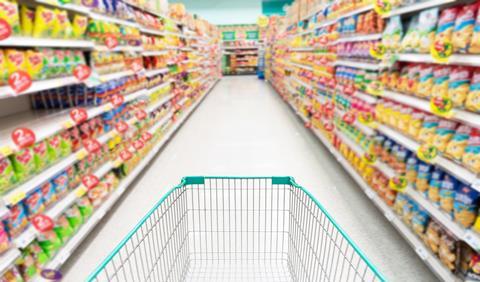UK retailers continue to roll back prices as they compete for consumers, September Kantar figures show

Take-home sales at UK supermarkets grew by 2 per cent during the four weeks to 29 September, according to the latest data from Kantar.
The figures, which come ahead of the Chancellor’s autumn budget, show that spending on promoted items continued to rise, climbing by 7.4 per cent in September as households manage their finances. Nevertheless, full-price sales nudged up by 0.3 per cent.
The sales period also saw grocers continue to roll back prices on some essentials as they compete for value.
Commenting on Kantar’s latest retail sales figures, Fraser McKevitt, head of retail and consumer insight at Kantar, says: “In the fiercely competitive retail sector, the battle for value is on. Supermarkets are doing what they can to keep costs down for consumers, and thanks to their efforts the prices in some categories are falling.”
The unseasonably wet weather in September also affected shopping patterns, Kantar figures show, with consumers rushing for classing warming staples like soup.
Meanwhile, the proximity to Halloween meant pumpkins ‘flew off shelves’, with sales nearly doubling last September’s figures at just under £1 million in four weeks.
In terms of retailer performance in this four-week period, Britain’s biggest supermarket Tesco achieved its largest share since December 2017. It now takes 28 per cent of the market, up from 27.4 per cent one year ago, according to Kantar figures.
Sainsbury’s’ sales increased by 5.1 per cent, with its market share stepping up 0.4 percentage points to 15.2 per cent. Asda’s hold of the market is now 12.6 per cent.
Ocado was the fastest growing grocer for the eighth month running, pushing its sales up by 10 per cent over the latest 12 weeks, the figures show.
The online specialist’s market share grew by 0.1 percentage points to 1.8 per cent. The overall online market expanded by 3.5 per cent over the 12 weeks, now worth £3.7 billion, with 22.1 per cent of households shopping online.
Spending through Lidl’s tills climbed by 8.8 per cent, with the discounter adding 0.5 percentage points to its share of the market – bringing it to 8.1 per cent. Sales at Aldi, Britain’s fourth largest retailer, account for 9.8 per cent of spending at the grocers. Meanwhile Morrisons makes up 8.6 per cent of the market, the same proportion as a year ago.
Both Waitrose and Iceland’s market share held steady at 4.6 per cent and 2.2 per cent respectively. Convenience retailer Co-Op now has a 5.9 per cent share.



